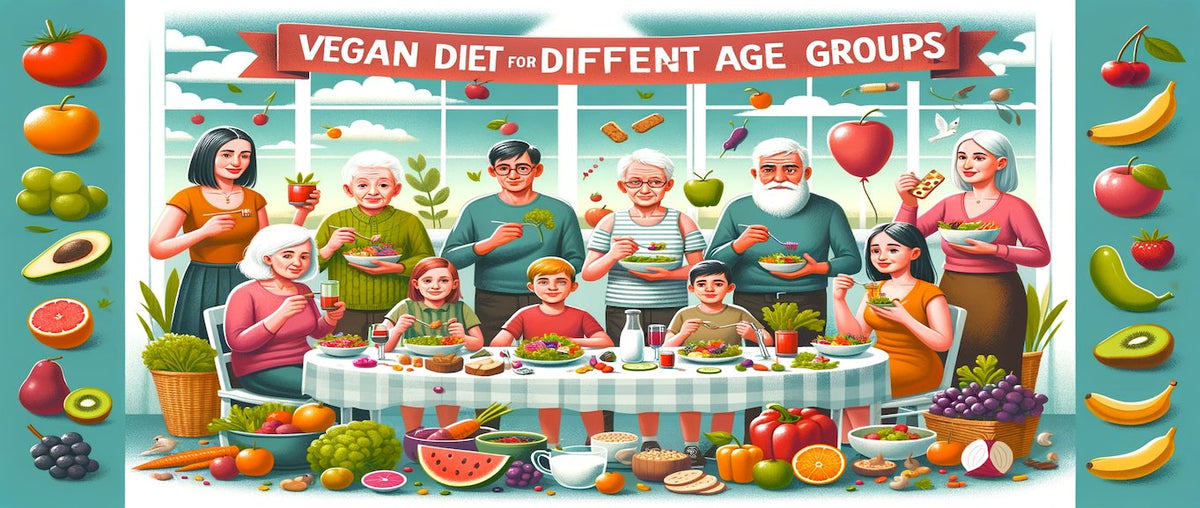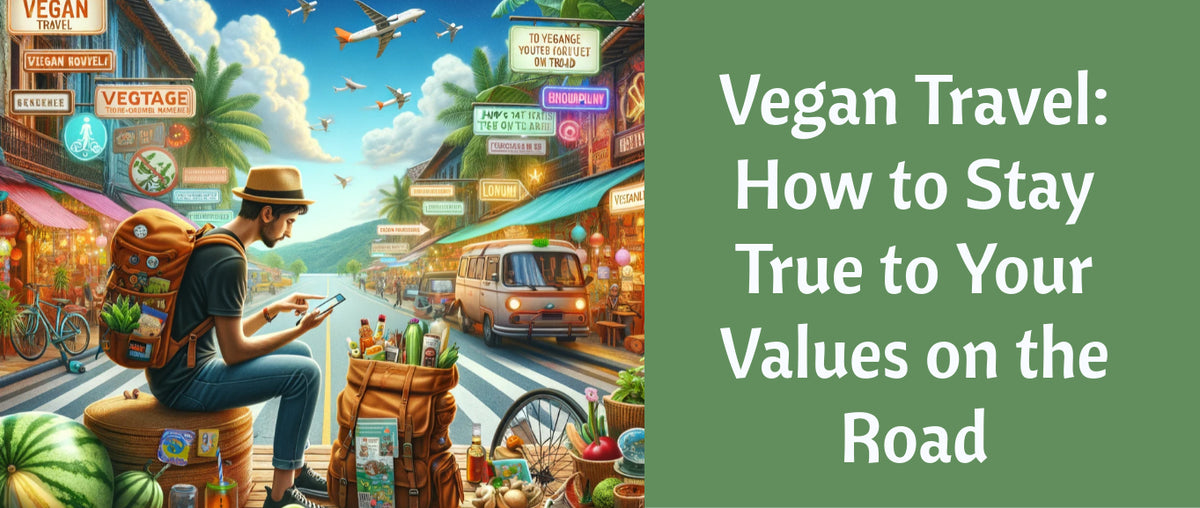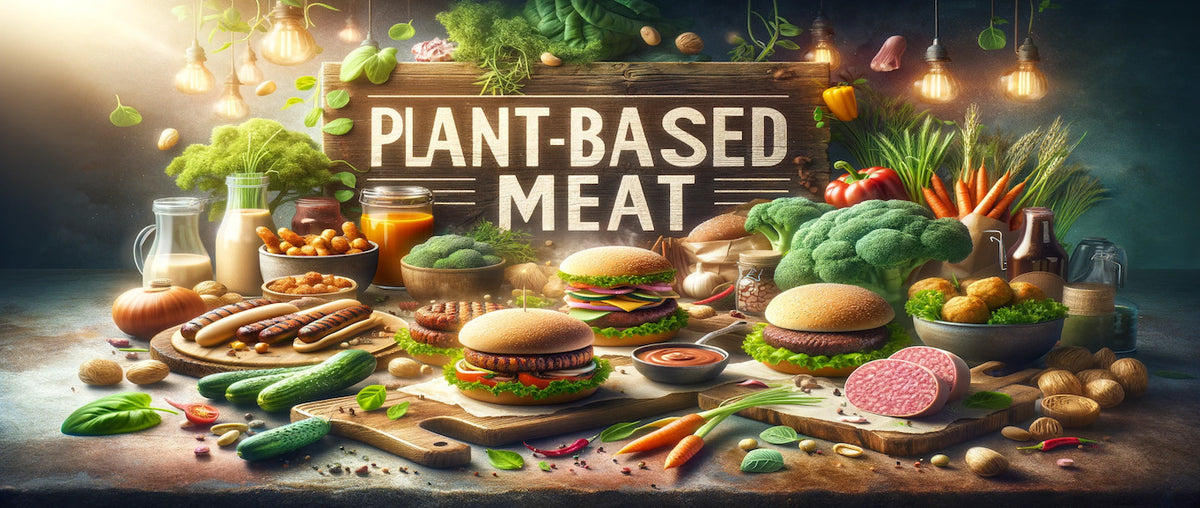The Ultimate Vegan Diet for Different Age Groups
Veganism, a lifestyle choice centered around excluding all forms of animal products from one's diet, has been gaining immense popularity. This dietary choice, often rooted in ethical, environmental, and health reasons, can be beneficial when appropriately planned. However, the nutritional needs Vegan Diet for Different Age Groups, necessitating a tailored approach for each. Understanding these differences is crucial for maintaining a balanced and healthy vegan diet.
Key Takeaways
- Vegan Diet Benefits: Health, environmental, and ethical.
- Nutritional Focus: Importance of calcium, vitamin D, iron, B12, and omega-3.
- Age-Specific Needs: Tailored approaches for children, young adults, adults, and seniors.
- Overcoming Challenges: Addressing common deficiencies and debunking myths.
- Practical Tips: Easy recipes and transitioning advice.

Understanding Vegan Diets
Well-Planned Vegan Diet: Definition
A well-planned vegan diet is one that adequately provides all necessary nutrients while excluding animal products. It involves careful consideration of dietary sources for essential nutrients typically obtained from animal products, like protein, iron, calcium, vitamin B12, and omega-3 fatty acids. Such a diet is not just about eliminating animal products but also about enriching the diet with a variety of plant based foods like fruits, vegetables, whole grains, nuts, seeds, and legumes.
Benefits of a Vegan Diet
- Health: Lower risks of heart disease, hypertension, type 2 diabetes, and certain cancers.
- Environmental: Reduced carbon footprint and lesser impact on climate change.
- Ethical: Avoidance of animal exploitation and support for animal welfare.
Nutritional Building Blocks of a Vegan Diet
Vegan Sources of Calcium and Vitamin D
Calcium and vitamin D are vital for bone health, with plant based sources including:
- Calcium: Green leafy vegetables (broccoli, cabbage), fortified plant based drinks, tofu, sesame seeds, pulses, and certain bread.
- Vitamin D: Sunlight exposure, fortified spreads, and supplements.
Vegan Sources of Iron
Iron is essential for red blood cell production. Vegan sources include:
- Pulses, wholemeal bread and flour, fortified breakfast cereals, dark green vegetables, nuts, and dried fruits.
Vegan Sources of Vitamin B12
Vitamin B12, crucial for nerve health and blood formation, is a nutrient of particular concern in vegan diets. While primarily found in animal products, vegans can source B12 from:
- Fortified breakfast cereals and unsweetened soya drinks.
- Nutritional yeast flakes and yeast extracts like Marmite.
Vegan Sources of Omega-3 Fatty Acids
Omega-3 fatty acids, known for heart health benefits, can be obtained from:
- Plant oils (flaxseed, rapeseed), chia seeds, hemp seeds, and walnuts.
Vegan Diet for Children and Adolescents
Ensuring proper nutrition in vegan diets for growing children and adolescents is crucial.
Plant Based Diets: Are They Healthy for a Child?
A plant based diet can be healthy for children if well-planned to ensure they receive all essential nutrients. Key focuses should be on:
- Protein for growth.
- Iron, calcium, and vitamin D for bone health.
- Omega-3 fatty acids for brain development.
Energy Needs and Growth
Children's diets should provide enough energy for growth and development. This can be achieved through a variety of plant-based foods like whole grains, legumes, fruits, and vegetables.
Protein and Essential Amino Acids
Protein is crucial for a child's growth. Vegan sources include:
- Legumes, nuts, and seeds.
- Soy products like vegan cheese and plant-based cheese.
Healthy Vegan Meal Ideas for Kids
Introducing appealing and nutritious vegan meals to kids can include:
- Smoothies with cashew butter or vegan butter.
- Sandwiches with vegan mayo and fresh vegetables.
- Snack plates with cut fruits, vegan cheese, and whole grain crackers.

Vegan Diet in Young Adults (18-30 Years)
Young adults often have busy lifestyles, making quick and nutritious meals essential.
Balancing Nutrition with a Busy Lifestyle
Quick meal solutions for young adults might include:
- Overnight oats with fruits and nut butter.
- Stir-fries with a variety of vegetables and tofu.
- Salads topped with seeds, nuts, and plant-based cheese.
Supplements and Nutrients of Concern
Apart from a balanced diet, young adults may need supplements for:
- Vitamin B12.
- Iron, especially for menstruating females.
- Calcium and vitamin D.
Vegan Diet for Adults (30-45 Years)
This age group needs to focus on nutrient-rich foods to manage stress and maintain energy levels.
Meeting Nutritional Needs During Prime Working Years
Key nutritional focuses should include:
- B-vitamins for energy.
- Magnesium for stress management.
- cholesterol free foods to maintain heart health.
Vegan Diet and Parenting
Parents following a vegan diet can ensure their family's nutritional needs are met by:
- Including a variety of vegan food products in meals.
- Educating children about plant-based foods and their benefits.
- Making meal times enjoyable and educational.
Also Read
Vegan Diet for Older Adults (45+ Years)
As we age, our nutritional needs evolve, and a vegan diet can be adapted to meet these changes.
Nutrition for Longevity and Health
For older adults, the focus should be on:
- Omega-3 fatty acids for brain and joint health, available in flaxseeds and walnuts.
- Adequate plant-based protein sources, like lentils and Vegan products like tofu.
- Vitamin D and calcium for bone health, which can be sourced from fortified plant-based foods.
Adapting the Vegan Diet for Seniors
Older adults should focus on:
- Easy-to-digest foods, such as smooth soups and purées.
- Cholesterol-free foods to maintain heart health.
- Fat-free butter and spreads for everyday use.
Vegan Nutrition for Specific Needs
Addressing the unique nutritional needs for various life stages and conditions is crucial in a vegan diet.
Vegan Nutrition for Mothers and Children: Practical Tools for Healthcare Providers
Healthcare providers can guide vegan mothers and children by:
- Providing resources on balanced vegan nutrition.
- Suggesting supplements like B12 and iron, when necessary.
- Recommending a variety of vegan food products to meet diverse dietary needs.
Vegan Diet During Pregnancy and Breastfeeding
Pregnant and breastfeeding women need to focus on:
- Increased caloric intake with nutrient-dense plant-based foods.
- Supplements like B12, iron, and DHA for fetal development.
- Vegan sources of calcium and vitamin D for bone health.
Transitioning to a Vegan Diet at Any Age
Transitioning can be made smoother by:
- Gradually introducing Vegan products like Vegan Cheese and plant based cheese .
- Trying a variety of vegan butter and spreads.
- Experimenting with different vegan mayo and condiments for added flavors.
Challenges and Solutions
Adopting a vegan diet comes with its set of challenges, but they can be overcome with proper planning.
Common Nutritional Deficiencies and How to Avoid Them
Potential deficiencies in a vegan diet include:
- Vitamin B12: Found in fortified foods or supplements.
- Iron: Sourced from legumes, seeds, and fortified cereals.
- Omega-3 Fatty Acids: Available in flaxseeds, chia seeds, and hemp seeds.
Debunking Myths About Vegan Diets Across Age Groups
Some common myths include:
- Protein deficiency: A variety of plant-based foods provide ample protein.
- Calcium and bone health: Green leafy vegetables and fortified foods are great sources.
- Lack of energy: Well-balanced vegan diets can provide all necessary energy.

Recipes and Meal Ideas
Providing practical and delicious vegan recipes for each age group.
For Children and Adolescents
- Homemade vegan cheese pizzas with a variety of toppings.
- Veggie wraps with vegan mayo and fresh salad.
For Young Adults
- Quick stir-fry dishes with tofu and Cashew Butter sauce.
- Hearty salads with plant-based cheese and beans.
For Adults
- Vegan butterbased pastas with nutrient-rich vegetables.
- Cholesterol-free foods in creative recipes for heart health.
For Older Adults
- Soft foods like stews and soups with legumes and soft-cooked vegetables.
- Fat-free butter spreads on whole grain toasts.
Conclusion
Emphasizing the importance of a well-planned vegan diet across different life stages, this article highlights the benefits, challenges, and solutions to maintaining a healthy vegan lifestyle. Whether it's for children, adults, or seniors, a balanced vegan diet can meet all nutritional needs when properly managed.
If you are a vegan, looking to dine something vegan in your city, check out our list of vegan restaurants in India.










